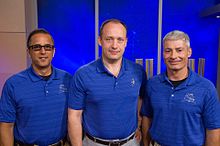cosmos.wikisort.org - Spacecraft
Soyuz MS-06 was a Soyuz spaceflight which launched on 13 September 2017.[1] It transported three members of the Expedition 53 crew to the International Space Station. Soyuz MS-06 was the 135th flight of a Soyuz spacecraft. The crew consisted of a Russian commander, and two American flight engineers.[3] It returned to Earth on 28 February 2018 after 168 days in orbit.[2]
 Soyuz MS-06 night launch to the ISS | |
| Mission type | ISS crew transport |
|---|---|
| Operator | Roskosmos |
| COSPAR ID | 2017-054A |
| SATCAT no. | 42937 |
| Mission duration | 168 days 5 hours 13 minutes 58 seconds |
| Spacecraft properties | |
| Spacecraft | Soyuz MS |
| Spacecraft type | Soyuz-MS 11F747 |
| Manufacturer | RKK Energia |
| Launch mass | 7080 kg |
| Crew | |
| Crew size | 3 |
| Members | Alexander Misurkin Mark T. Vande Hei Joseph M. Acaba |
| Start of mission | |
| Launch date | 12 September 2017, 21:17:02 UTC[1] |
| Rocket | Soyuz-FG |
| Launch site | Baikonur, Site 1/5 |
| Contractor | Progress Rocket Space Centre |
| End of mission | |
| Landing date | 28 February 2018 02:31 UTC [2] |
| Landing site | Steppes of the Kazakhstan |
| Orbital parameters | |
| Reference system | Geocentric orbit |
| Regime | Low Earth orbit |
| Inclination | 51.66° |
| Docking with ISS | |
| Docking port | Poisk zenith |
| Docking date | 13 September 2017, 02:55 UTC |
| Undocking date | 27 February 2018, 23:08 UTC |
| Time docked | 167 days 20 hours 13 minutes |
 (l-r) Acaba, Misurkin and Vande Hei Soyuz programme (Crewed missions) | |
Crew
| Position | Crew member | |
|---|---|---|
| Commander | Expedition 53 Second spaceflight | |
| Flight Engineer 1 | Expedition 53 First spaceflight | |
| Flight Engineer 2 | Expedition 53 Third spaceflight | |
Backup crew
| Position[4] | Crew member | |
|---|---|---|
| Commander | ||
| Flight Engineer 1 | ||
| Flight Engineer 2 | ||
| External video | |
|---|---|
Due to a decision to cut down the number of participating Russian astronauts in 2017, changes were made in crew assignments to the ISS.[5] Originally set to be on Soyuz MS-04, Alexander Misurkin and Mark T. Vande Hei have been assigned to Soyuz MS-06 instead.[3]
References
- Pietrobon, Steven (5 February 2017). "Russian Launch Manifest". Sworld.com. Retrieved 12 February 2017.
- Bergin, Chris (27 February 2018). "Soyuz MS-06 returns three ISS crew members to Earth". NASASpaceflight.com. Retrieved 28 February 2018.
- "NASA Updates 2017 International Space Station Crew Assignments". NASA. 15 November 2016. Retrieved 22 November 2016.
 This article incorporates text from this source, which is in the public domain.
This article incorporates text from this source, which is in the public domain. - "Manned Spaceflight Launch and Landing Schedule". SpaceFacts. Retrieved 22 November 2016.
- Irene Klotz (16 November 2016). "NASA, Russia Set Flights for Trimmed-Down Space Station Crew". Space.com. Retrieved 21 November 2016.
На других языках
- [en] Soyuz MS-06
[es] Soyuz MS-06
Soyuz MS-06 es un vuelo espacial del Soyuz lanzado el 13 de septiembre de 2017.[1] Transporta a tres miembros de la tripulación de la Expedición 53 hacia la Estación Espacial Internacional. MS-06 es el vuelo número 135 de una nave espacial Soyuz. El equipo estará compuesto por un comandante y un ingeniero de vuelo rusos, como así también un ingeniero de vuelo estadounidense.[ru] Союз МС-06
«Союз МС-06» — российский транспортный пилотируемый космический корабль, старт которого осуществлён 13 сентября 2017 года 00:17:02 мск[2] с космодрома Байконур. После четырёхвитковой схемы сближения, корабль пристыковался к международной космической станции, а экипаж экспедиции МКС-53/54 перешёл на МКС.Текст в блоке "Читать" взят с сайта "Википедия" и доступен по лицензии Creative Commons Attribution-ShareAlike; в отдельных случаях могут действовать дополнительные условия.
Другой контент может иметь иную лицензию. Перед использованием материалов сайта WikiSort.org внимательно изучите правила лицензирования конкретных элементов наполнения сайта.
Другой контент может иметь иную лицензию. Перед использованием материалов сайта WikiSort.org внимательно изучите правила лицензирования конкретных элементов наполнения сайта.
2019-2025
WikiSort.org - проект по пересортировке и дополнению контента Википедии
WikiSort.org - проект по пересортировке и дополнению контента Википедии


